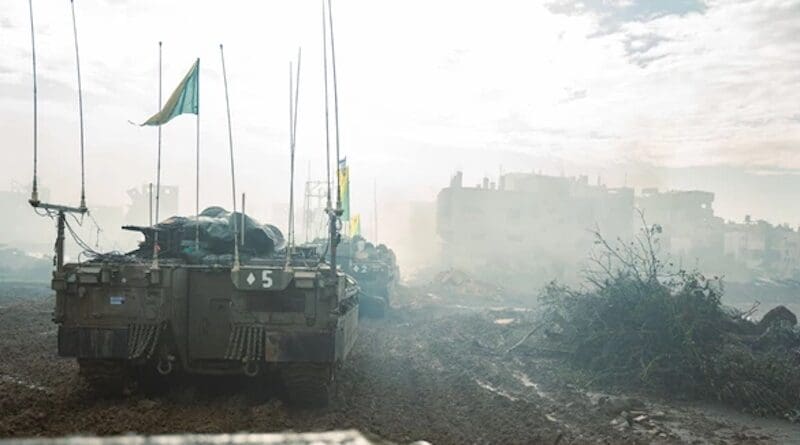Borrell Says ‘Humanitarian Situation Could Not Be Worse’ in Gaza
By VOA
European Union foreign policy chief Josep Borrell said Monday that the way Israel is carrying out its war against Hamas in the Gaza Strip is “seeding hate for generations.”
Borrell spoke ahead of separate talks EU ministers are holding Monday with Israeli Foreign Minister Israel Katz and the Palestinian Authority’s top diplomat, Riyad al-Maliki.
“We have in mind what Hamas is, what Hamas has done, and certainly we reject and we condemn,” Borell told reporters. “But the peace and stability cannot be built only by military means, and not in this particular way of using military means.”
Borrell has been among the Western officials who have criticized the number of civilian casualties in Gaza. The Hamas-run health ministry in Gaza says at least 25,295 Palestinians have been killed, many of them women and children. The ministry does not specify the number of civilians and Hamas fighters among the dead.
“The humanitarian situation could not be worse,” Borrell said. “There [are] no words to explain how the situation is, with hundreds of thousands without anything, without shelter, without food, without medicine and under the bombs. And every day, there is a high toll of civilian people being killed.”
Israel has blamed Hamas for putting civilians in danger, saying the militant group intentionally operates in residential areas and in a network of tunnels underneath.
The fighting in Gaza continued Monday with Israeli airstrikes targeting Hamas militants in the northern, central and southern regions.
Airstrikes and fierce fighting were reported in the southern city of Khan Younis, the second-largest city in the Gaza Strip.
The Palestinian Red Crescent Society said its ambulances were unable to reach the wounded in Khan Younis due to Israeli troops besieging the group’s ambulance center.
Israel vowed to destroy Hamas, which governs Gaza, after the militant group sent fighters rampaging into Israel on Oct. 7, killing around 1,200 people, mostly civilians, according to Israeli tallies. Hamas, which has been designated a terrorist organization by the U.S. U.K, EU and others, also took about 240 people hostage.
Groups of relatives of the hostages disrupted an Israeli parliamentary committee meeting Monday, demanding lawmakers do more to free those still being held. The demonstration was the latest in a string of similar actions in recent days, including a protest Sunday near Prime Minister Benjamin Netanyahu’s Jerusalem residence.
Netanyahu on Sunday rejected a proposal by Hamas to end the war.
“In exchange for the release of our hostages,” the Israeli leader said in a statement, “Hamas demands the end of the war, the withdrawal of our forces from Gaza, the release of all the murderers and rapists. And leaving Hamas intact.”
“I reject outright the terms of surrender of the monsters of Hamas,” Netanyahu said.
Hamas on Sunday defended its terror attack on Israel but admitted to “faults” and called for an end to “Israeli aggression” in Gaza.
In its first public report on the attack that began the war, the militant group said it was a “necessary step” against Israeli occupation of Palestinian territories, and a way to secure the release of Palestinian prisoners.
In late November, in a deal brokered by the United States, Qatar and Egypt, more than 100 of the estimated 240 hostages who were taken captive to Gaza were freed in exchange for the release of 240 Palestinians held in Israeli prisons.
Since that deal ended, Netanyahu has faced mounting pressure from within Israel and from some world leaders to secure the release of the 136 hostages who remain in captivity, perhaps two dozen of whom have died or been killed.
Some world leaders, but not U.S. President Joe Biden, have called for an immediate cease-fire in the fighting.
Netanyahu in recent days has also taken a strong position against Palestinian statehood as a way to stabilize the volatile Mideast and prevent the spread of the Israel-Hamas war throughout the region. Biden and other American officials have called for Palestinian statehood.
“I will not compromise on full Israeli security control of all territory west of the Jordan River,” he said.
Biden on Friday said he spoke with Netanyahu about possible solutions for the creation of an independent Palestinian state that could include a nonmilitarized government.
Netanyahu said that he has faced down “international and internal pressures” to change his position on Palestinian statehood.
“My insistence is what prevented for years the establishment of a Palestinian state that would have posed an existential danger to Israel,” Netanyahu said.
British Defense Secretary Grant Shapps told Sky News Sunday that it is “disappointing” to hear of Netanyahu’s opposition to a Palestinian state at the end of the Israel-Hamas war.
“Unless you pursue a two-state solution, I really don’t see that there is another solution,” Shapps said.
Discussing his administration’s position Friday, Biden said, “There are a number of types of two-state solutions.” Asked if a two-state solution was impossible with Netanyahu in office, Biden replied, “No, it’s not.”

